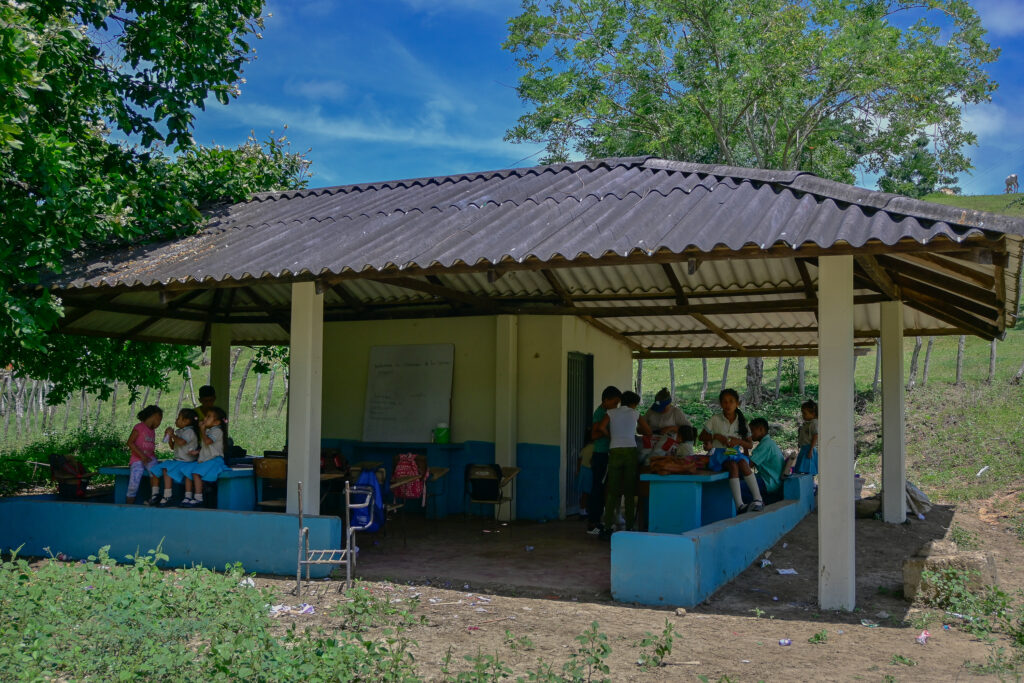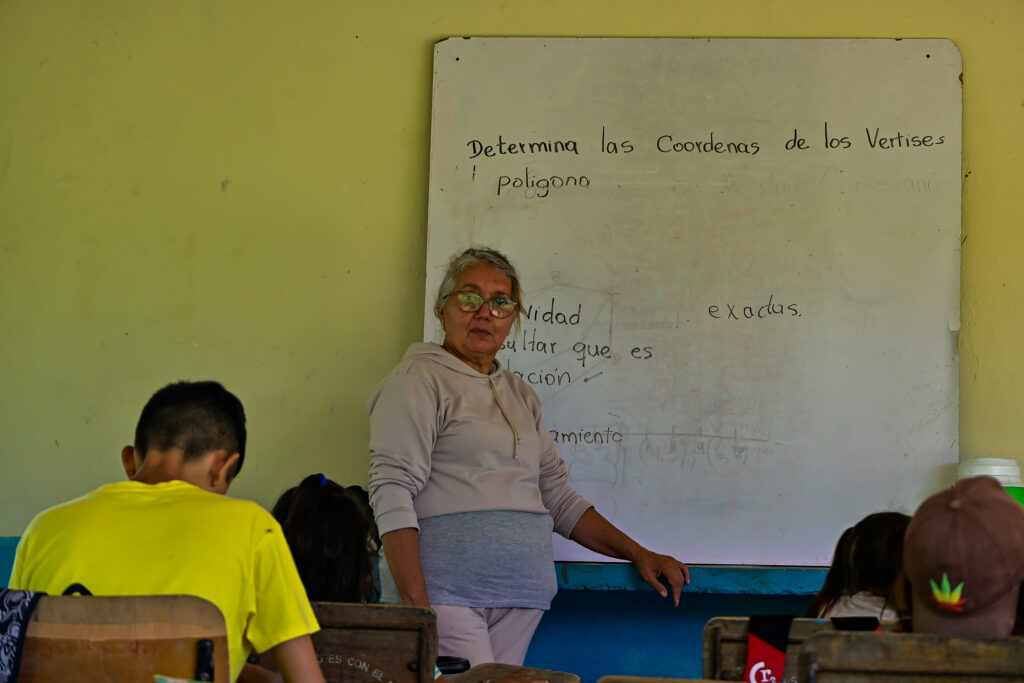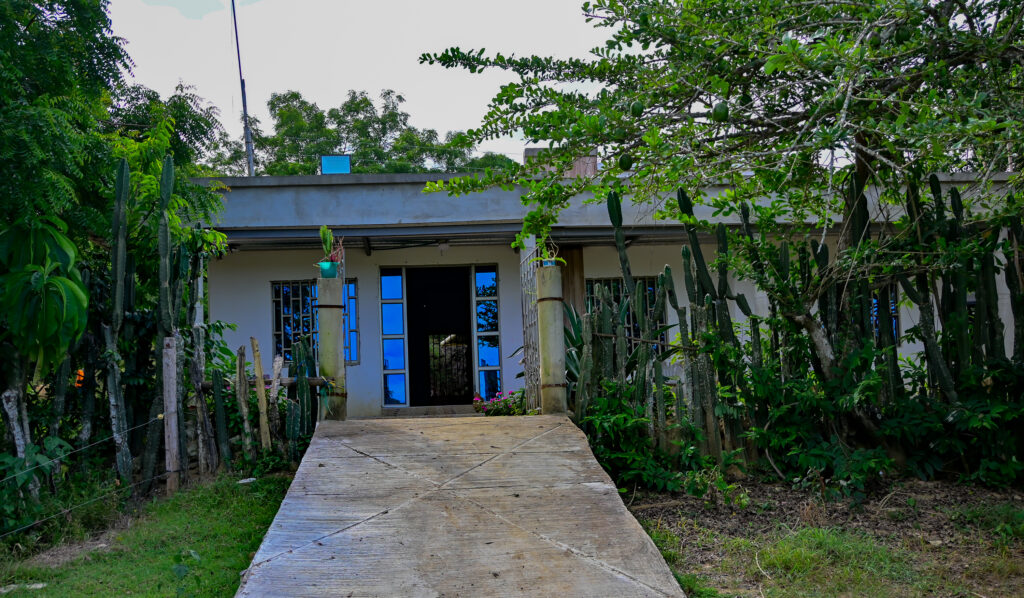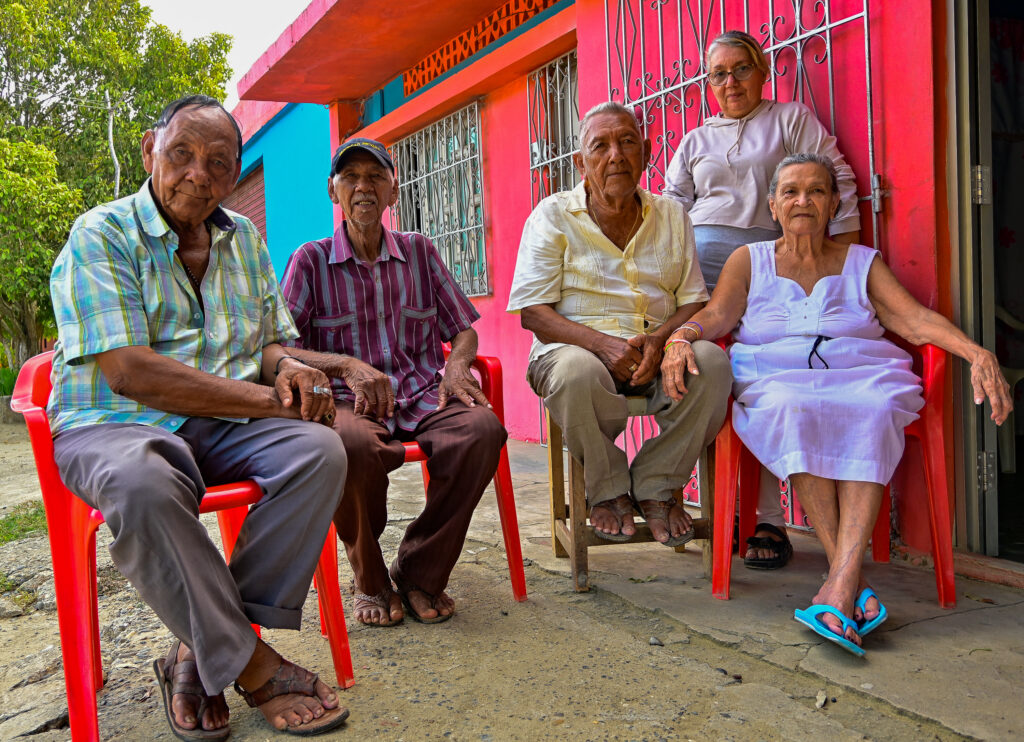Por Duvan Caro. Fotografías de Elmer Arrieta.
Nacida y criada en el corregimiento de Guaimaral, municipio de Córdoba Tetón, subregión Montes de María en el departamento de Bolívar, Colombia. Bernarda Verena Anaya Cohen de 57 años es profesora y escritora rural, quien con sus historias busca visibilizar las voces de las mujeres rurales para ayudarlas a realizar sus procesos de resiliencia ante las múltiples dificultades a las que se enfrentan.
La «profe» Verena Anaya Cohen empezó a escribir sus propios relatos como un proceso de sanación luego de verse sometida a distintas situaciones de violencia intrafamiliar .
Es docente desde hace más de 26 años, pero hace un par empezó su camino en la literatura.
Mis primeros «pininos»
Todo inició a sus 16 años al terminar sus estudios de bachillerato en la ciudad de Cartagena, donde reflexionaba sobre la situación económica por la que atravesaba su familia, situación que la llenó de mucha fuerza para regresar a su comunidad y tomar el trabajo de docente en la vereda de Bellavista, corregimiento de Guaimaral.

Dicha labor, le permitió darse cuenta de los desafíos que tiene el territorio y que la misma vida presenta.
Saber que no cuenta con las ayudas educativas, con los implementos necesarios para llevar a cabo una jornada de clases y la falta de vías terciarias a estos territorios cercanos a las grandes urbes del caribe, hacen que cada día sea más difícil la labor de los maestros de la ruralidad colombiana.
En la actualidad es docente en el colegio Centro Educativo de la vereda de Rancho Largo, donde junto a sus estudiantes de los grados 1°, 4° y 5° de primaria desarrolla sus clases en el restaurante escolar o bajo la sombra de un árbol, debido a que no cuenta con un espacio adecuado en donde realizar sus labores y sus estudiantes estén cómodos para recibirlas.
Esto se debe al deterioro y abandono en el que se encuentra la escuela por parte de las secretarías de educación municipal, regional y el ministerio de educación nacional de Colombia hacia las escuelas rurales de todo el país.

Bernarda no solo se dedica a la docencia sino también a dibujar, tejer y a escribir como un ejercicio de resiliencia ante los duros momentos que ha vivido a causa del maltrato y la violencia intrafamiliar, hasta el punto de entorpecer la crianza de sus hijos.
A sus 27 años nació su primer hijo y dos años después nació su segunda hija quienes al nacer marcaron un hito en su historia como mujer y como madre, la cual estaba siendo sometida a un flagelo de abusos y maltratos psicológicos, verbales y físicos por parte de su compañero sentimental, mismas que la obligaron a huir a casa de sus padres y asumir el rol de padre y madre en la crianza de sus hijos.
Otra de las pasiones que tiene La Profe es la preparación de deliciosos manjares tradicionales que hacen parte de la gastronomía regional del caribe colombiano.
Desde joven le ha gustado preparar dulces locales que posteriormente vende para tener otra entrada económica a su hogar como lo es el bollo de plátano maduro, el cual se amasa junto con maíz, se muele, y se envuelve en los cascarones de las mazorcas y luego se cocinan, tras 2 o 3 horas se pueden comer estos deliciosos bollos de platano.
«Yo soy una persona que le gusta hacer múltiples cosas y entre ellas están las de tener pequeñas ventas de dulces, comidas y otras cosas que me permiten tener pequeños ingresos extras. Esto fue lo que me permitió de una u otra manera solventar sola la crianza y manutención de mis hijos».
Es así como la profesora Verena Anaya da inicio a su primer libro titulado «La Vida. La Vida. Mujer Fuerte y Esforzada» el cual, en sus propias palabras, es escrito con el corazón.
Cada palabra presente en el relato son sabidurías dadas por Dios. Porque muchas mujeres lo van aceptar y les va a servir para sacar adelante ese día a día que viven lleno de dificultades. Este libro es un homenaje a la vida.
«Yo escribo para las mujeres. Para esas mujeres a las cuales la vida les ha presentado cantidades de obstáculos y que a medida que esos obstáculos van avanzando nos toca ir superandolos».
«La Vida, la Vida», es un libro compuesto por 7 capítulos en los cuales su autora narra momentos de su infancia, la llegada de algunos inventos tecnológicos de la época al pueblo, su adolescencia, la llegada de sus primeros hijos y todos esos momentos de tribulaciones y tristezas que marcaron su vida.
Este, su primer libro, es lanzado al mercado internacional este 19 de julio 2022 a las 12 pm por la plataforma de amazon.com.
La profesora Berena quiere que el mundo entero lea, comparta y conozca las historias del caribe profundo que ella relata en su libro al tiempo que comparte sus sentires.
¿Qué es ser mujer rural?
«Nosotras las mujeres rurales, somos aquellas que nos dedicamos al campo, las que no tenemos todas las cosas a la mano. Las que sabemos que el agua no nos va a llegar por la tubería, si no que toca ir a buscarla en burro al pozo. Esa mujer a la que todo se le va a dificultar por las desigualdades, por la violencia de los grupos armados y la intrafamiliar que tenemos vivimos en nuestras comunidades».
«A nosotras como mujeres rurales, nos toca ser muy esforzadas y muy fuertes para seguir avanzando y sobrellevar la vida de nosotras y con ella las de nuestras familias. Y estas son las cosas que yo busco resaltar en mi libro».

De muchas formas, Verena ha venido sorteando los obstáculos a los que ella misma se enfrenta y sigue enfrentándose como mamá, y ahora con sus experiencias busca apoyar a otras mujeres a sanar sus heridas más profundas enraizadas por la violencia que sufren a diario las mujeres rurales, campesinas y étnicas.

El conflicto armado
En la década del 2000 la violencia marcó de manera transversal la vida y la labor de muchos profesores de las escuelas rurales de Colombia. Los docentes no podían ver, escuchar y menos hablar sobre la violencia que estaban viviendo junto a sus estudiantes en los centros educativos, centenares de comunidades quedaron en medio del terror y el horror instaurado por los actores armados que se movilizaban día y noche por la zona sin ningún control por parte de las fuerzas del estado.
En la comunidad de Guaimaral pasaron cosas horribles, hubo mucha violencia que hasta el día de hoy siguen marcando la rutina de sus pobladores. En muchos hogares de la comunidad tocó vivir en carne propia el acoso y violencia ejercida por las estructuras armadas.
La Seño Verena se considera un ave fénix, y tiene muchas ganas de seguir escribiendo relatos macondianos de la región para mostrarlos ante el mundo haciendo uso de las plataformas digital, en donde busca que las personas y especialmente las mujeres que han sufrido violencia intrafamiliar encuentren en sus textos un camino de resiliencia.
Te puede interesar: Huir para sobrevivir: comunidades del Caribe colombiano enfrentan erosión e inundaciones

